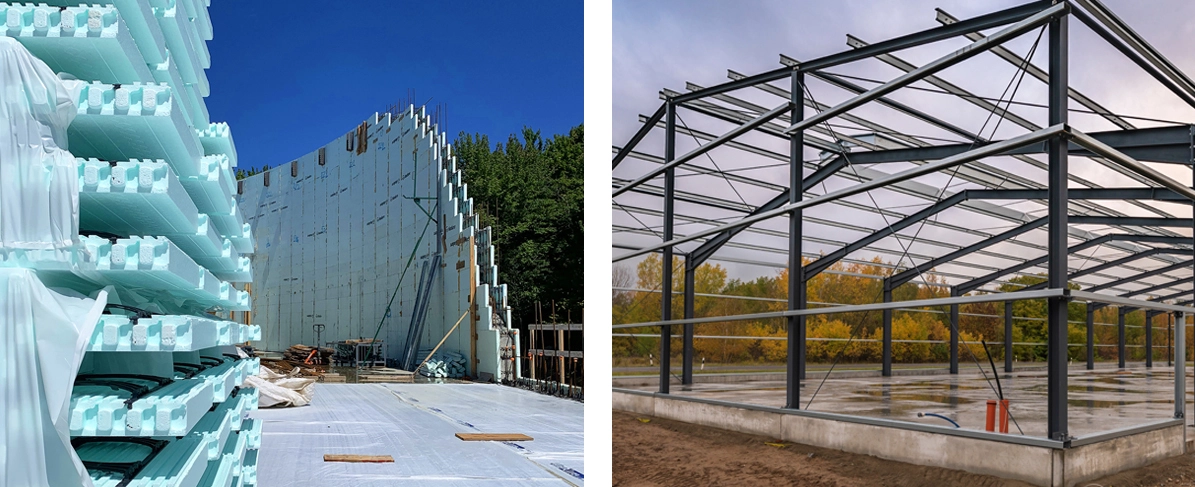

If you’re planning a large-scale commercial build, choosing the right building materials is the foundation for your success. Considerations such as energy efficiency, budget and long-term performance are essential when comparing your options. Insulated Concrete Forms (ICFs) and steel construction stand out as top contenders, but which is the best solution for your project’s needs?
This guide offers a detailed comparison of ICFs and steel-framing, examining critical factors such as durability, energy efficiency and cost-effectiveness.
When it comes to thermal performance, ICFs far surpass steel construction. ICF walls feature continuous insulation (CI) on both the interior and exterior, eliminating thermal bridging, minimizing air leakage and improving energy efficiency. For example, a standard 6-inch Nudura ICF wall achieves an R-value of R24. Meanwhile, steel’s high thermal conductivity leads to significant heat transfer issues, reducing conventional insulation effectiveness by up to 63% ..
The energy inefficiency with steel significantly impacts HVAC performance, resulting in higher operational expenditures over the life of the building and potential occupant discomfort due to inconsistent indoor temperatures. With ICFs, you not only have optimal energy performance but also lower HVAC demand, which can reduce monthly utility bills by up to 60%.
Steel construction, while known for its speed of erection, often involves detailed pre-design, specialized fabrication and precise assembly. These requirements can lead to delays, especially when heavy equipment is required for installation.
Nudura ICFs streamline construction with their all-in-one building solution. Each lightweight ICF block integrates six building steps, including framework, insulation, air and vapor barriers as well as anchorage for finishes. Additionally, Nudura’s installer training is simplified to a one-day in-person course, allowing for a faster and more efficient construction process.
Steel construction might appear more affordable upfront, however the whole wall costs for the additional insulation, fireproofing and other materials to close in the building add up quickly. These extra expenses are just to meet building and energy codes and withstand environmental conditions and don’t factor in the time and labor to install them.
Though they may seem more expensive initially, Insulated Concrete Forms are a better long-term investment. The combined building steps into one system, means fewer stages during construction and significant cost savings on insulation, fireproofing, durability and long-term maintenance. Their inherent energy efficiency reduces annual operating expenses, while the quick and easy installation minimizes the trades on site and reduces labor costs.
Both ICFs and steel framing are durable options for a building’s structural walls, but they perform differently in extreme conditions. ICF structures can withstand winds up to 250 mph (402.34 km/h) and flying debris, making them ideal for hurricane-, tornado-prone and high-wind regions. They are also fire-resistant, providing up to a 4-hour fire rating (for 6” (152 mm) concrete core form or greater) and ensuring the structural integrity of buildings in the face of flames or wildfires. Nudura ICFs have been tested by the U.S. military to resist blasts and high caliber impacts and used for military buildings and safe rooms showcasing their resiliency to natural disasters. to natural disasters.
Steel also offers impressive strength, standing up to winds of up to 170 to 180 mph (273.59 to 289.68 km/h). However, its fire resistance is less reliable, as steel loses its strength when exposed to high temperatures. Without additional fireproofing measures and their increased expense, a steel-frame building alone can put the structural integrity of the building and its occupant’s safety at risk.
For commercial projects that demand sustainability, efficiency and durability, ICFs are the smarter choice compared to steel framing. They offer enhanced thermal performance, faster installation, disaster mitigation and cheaper whole wall costs. They excel where other materials fall short, delivering lasting value for all types of commercial builds.
Contact us today to learn more and start your project with confidence!